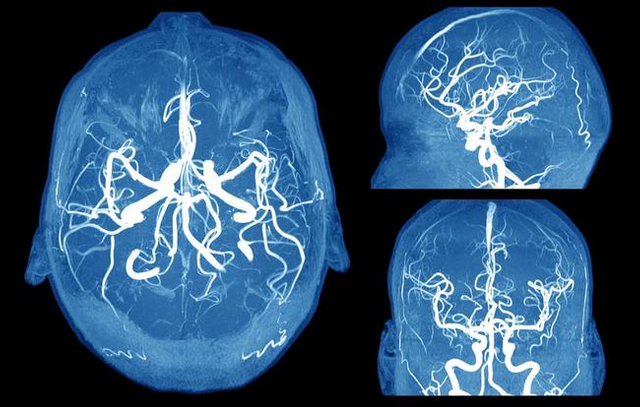Know the Type of Brain Aneurysm Disease That Threatens Your Life. You must be vigilant

Hi steemians lovers of world health.
Do you know what is a brain aneurysm? Perhaps many of us are not familiar with this type of dangerous disease. Let us know what are the signs and symptoms of a brain aneurysm that you should be aware of. And what treatment actions can be done to overcome them.
Aneurysms of the brain or commonly referred to as cerebral aneurysms are conditions in which there is dilation of blood vessels in the brain. The widening that occurs in brain aneurysms mainly takes place at the junction of large arteries, in areas in which the medical term is referred to as the Willis Circle.
The widening in the blood vessels of the brain will become a kind of bag that bubbles in the middle of the vessels and can cause brain bleeding if the bubble breaks. If it is already in severe stage, then the chances of survival are getting smaller. If survived, most likely the patient will experience permanent disability. [1]
Aneurisma terjadi ketika bagian dari pembuluh darah (arteri) menonjol atau membengkak, baik karena struktur pembuluh darah yang rusak, atau karena ada kelemahan pada dinding pembuluh darah tersebut. Ketika aneurisma terjadi, maka pembuluh darah akan menggembung pada bagian tertentu. Penonjolan bisa sangat kecil atau sangat besar, pembesaran inilah yang akan menimbulkan tekanan pada organ sekitarnya. Selain itu akibat ini menimbulkan resiko pecahnya pembuluh darah, ya seperti sebuah balon apabila apabila semakin mengembung terus bertambah maka bisa pecah, begitu pula dengan balon aneurisma ini. [2]
Causes An aneurysm that occurs in the brain
Brain aneurysms are generally not due to genetic factors but develop along with the age of a person.
Here are some of the causes of brain aneurysms are:
Neurofibromatosis
Neurofibromatosis is a genetic disorder of the nervous system that affects the growth and development of nerve cell tissue that causes tumor growth in nerves thereby triggering a brain aneurysm.Tobacco consumption
Chewing tobacco or smoking is another factor that primarily increases the risk of aneurysm rupture.
Studies show that smokers have a 10-fold greater risk of brain rupture outbreaks than nonsmokers.
High Blood Pressure
The risk of subarachnoid hemorrhage or rupture of cerebral aneurysms will be greater in people with a history of high blood pressure (hypertension).High Cholesterol
Although the effects of high cholesterol remain unclear, some studies suggest that cholesterol can also trigger rupture of aneurysms in the brain.Alcohol Abuse
Moderate to high alcohol consumption is another factor that contributes to the rupture of brain aneurysms. [3]
Symptoms of Brain Aneurysm
Most people with brain aneurysms do not experience symptoms before the onset of rupture. It broke out suddenly. Up to 40% of people experience 'sentinel headaches' a few days to weeks before rupture and this is considered a 'warning sign of leakage'. At the time the aneurysm broke, the following may occur:
Immediate attacks of severe headaches (often described as "worst" headaches in their lives.
- Neck stiffness
- Nausea and vomiting
- Vision and speech impairment
- Numbness and weakness of any body part
- Seizures
- Sensitivity to light
- Loss of consciousness
(One of these symptoms is very serious, and if this happens to you immediately seek an emergency medical to find out then handle it before it is dangerous). [4]
How To Treat Brain Aneurysm
There are several options or paths in overcoming this brain aneurysm. One is by surgery or surgery, but to run this option medical experts should also consider the severity of this brain aneurysm disease. This surgery is usually done what if this aneurysm has broken and resulted in flowing in the brain daraah.
One type of surgery is occlusion. Occlusion is one way of dealing with aneurysms by surgery or surgery by stopping blood flow from arteries leading to brain aneurysms by changing the route or blood flow.
The next operation option is Clipping. Clipping is a general surgical treatment for brain aneurysms.
This method is effective with the surgical procedure under study with excellent results. The purpose of clipping is to place small metal clips where this is done to prevent blood from getting into the aneurysm bag so that it can no longer pose a risk of bleeding.
In addition to surgery, cosevative measures also need to be given to these brain aneurysm patients. these conservative measures include stopping or avoiding smoking habits, keeping the blood pressure below normal, and avoiding high levels of alcohol consumption. [5]
Reference :
[1] (https://www.deherba.com/apakah-itu-aneurisma-otak.html)
[2] (https://mediskus.com/penyakit/aneurisma-pengertian-penyebab-gejala-pengobatan )
[3] (https://www.amazine.co/17973/penyebab-gejala-dan-pengobatan-aneurisma-otak/)
[4] (https://www.singhealth.com.sg/PatientCare/Overseas-Referral/bh/Conditions/Pages/Cerebral-Aneurysm.aspx)
[5] (http://www.referensisehat.com/2015/03/definisi-penyebab-gejala-pengobatan-penyakit-atau-gangguan-aneurisme-otak.html)